Imagine having a massive sales force…
One that is unlimited in size, marches out to nearly every corner of the internet selling your products and does so at absolutely no extra cost to you.
Thanks to the Shopify Buy Button, this is possible. The Buy Button allows you to create commerce almost any place you’d like.
Just embed the button anywhere that allows embeddable code and instantly begin earning sales outside your store in places like:
- Your non-ecommerce brochure website
- Blogs with related audiences
- Tumblr, Wordpress & Squarespace
- Special events or even physical locations
In addition to selling on the beautiful ecommerce store you’ve built on Shopify, you give shoppers the ability to buy without leaving the sites they already trust.
For example, with a few clicks, reviews from bloggers within your media network can be transformed into a transactional page that seamlessly blends editorial and commerce.
Consumers who click the button complete their order right there in a pop-up window. They’re not directed to your site or required to move through “the funnel.” Instead, with the touch of a button, they’re buying what you’re selling instantly.
This is just a glimpse as to how the buy button can be used.
We’ve compiled 11 use cases, both real and hypothetical, to help jump-start your imagination and explore what’s possible when you can sell practically anywhere online.
1. Turn Your Non-Ecommerce Web Pages Into Product Pages
Buy buttons have the potential to turn everyone into an ecommerce player- even if they’ve never experimented with selling online before.
Manufacturers like Blackmagic Design who traditionally rely on their brochure website to direct people to a reseller can experiment with opening their own direct sales channel without jumping headlong into a full ecommerce solution.
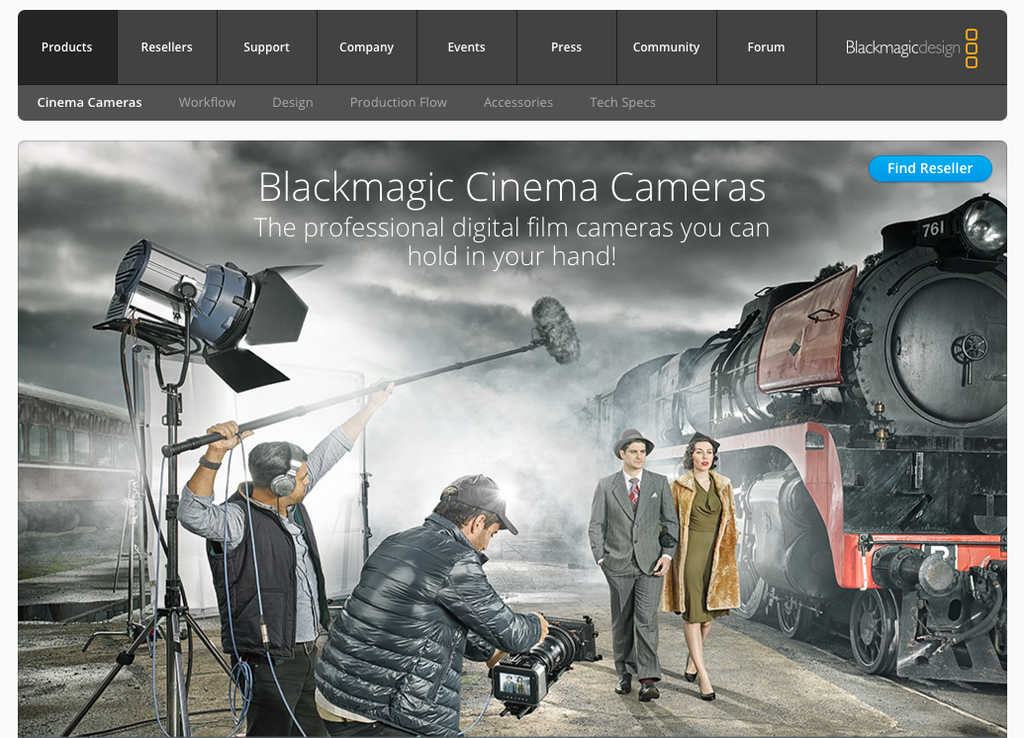
Likewise, agencies like Wieden+Kennedy or other large service based operations might streamline their payment operations by embedding a buy button on a private webpage for new clients.
2. Collecting Pre-orders Using The Buy Button
Offering customers an opportunity to pre-order an item is a smart way to gauge demand and forecast sales.
It’s easy to customize buy buttons to accept pre-orders on external websites.
Traditionally, when authors campaign for buzz during a book launch, they’ll do interviews, guest author on large media outlets, and send out screener copies for influencers to review. It’s not uncommon for an author to then funnel visitors from the media channel to the pre-launch site and collect pre-orders there.
It’s an ok way of doing things, but the looming threat of a text message, an app notification, or getting pinged on Slack, threatens to break your would-be prospect’s attention, losing what would have been a viable sale in-between clicks.
Buy buttons can streamline the pre-order process by allowing the customer to transact directly from the review, podcast page, or guest article.
It’s exactly how this Martin Goodall is selling his book on his publisher’s website, and his own blog long before the book is available:
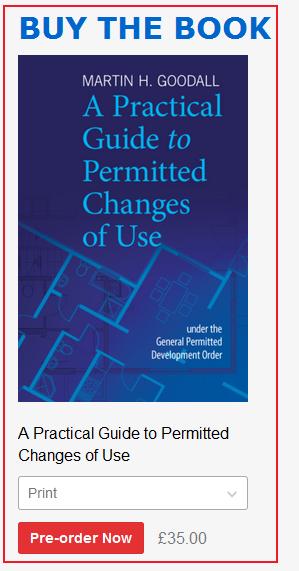
3. Buy Buttons Can Enhance Brand Storytelling
We all love a great storyteller...
Problem is many great brand storytellers wind up in the poor house because they fail to monetize their tales in meaningful ways.
Buy buttons can revolutionize the business models underpinning storytelling by creating brand new ways to monetize content:
- Partnering with affiliates who desire to touch a storyteller’s audience
- Embed opportunities to purchase information products created by the storyteller
- Offer richer alternatives of the story in audio or video formats featuring the storyteller herself
Great writers want to focus on their craft. But that focus can get in the way of generating revenue. Buy buttons are a quick and easy way for content marketers to ask for the sale.
For instance, rather than immediately asking prospects to purchase a watch, the Malta Watch Company spends time engaging users with content that highlights the inspiration for, workmanship involved in, and the scarcity inherent in the watches before using a buy button to sell on the spot:
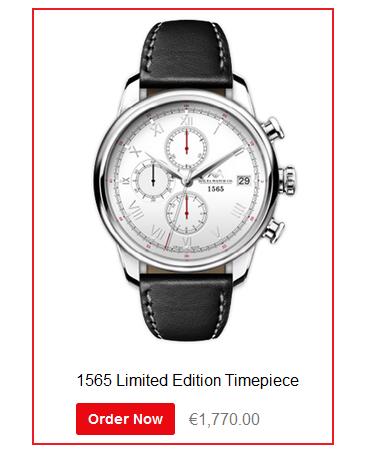
Buy buttons also offer bloggers an opportunity to monetize their work without being intrusive or interrupting loyal readers with ads or sales pitches.
Custom apparel designer Tiger Prints preserves the integrity of its blog content by including its products and buy buttons on a sidebar. Notice how the button’s content is customized:
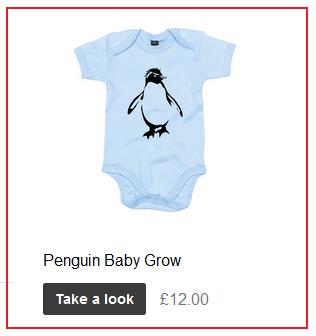
Mary Micouris, founder of Tiger Prints told me this when I asked why she decided to use buttons on the sidebar of her blog:
“I was struggling to get traffic to my shop and I was looking for a way to make the most of the traffic generated by my blog to drive traffic to the store (both my shopify blog and another blog I run.) It seemed crazy to work hard on the blog and then not be showing off my products to people who visited, so I put my buy button code in my sidebar code.”
Tiger Prints just started using buy buttons but is already planning to install them on other blogs the company manages. With a bit of help from the buy buttons, Micouris expects the company to be an overnight success soon.
4. Using a Buy Button to Enhance Publishing Brands
The buy button has the potential to help resurrect entire industries and create new streams of revenue for editorial brands...
Brands that rely on a broken advertising model, thanks to the demise of the cookie and ad blocking technology, can use buy buttons to instantly become ecommerce players and diversify their revenue streams.
For example, a newspaper or magazine might use the buy button to power their annual subscription sales. They can even offer digital downloads for additional consumption options.
In addition, they can use the buy button the same way International Traveller does on individual article pages as an opportunity to purchase the entire magazine directly from the article.
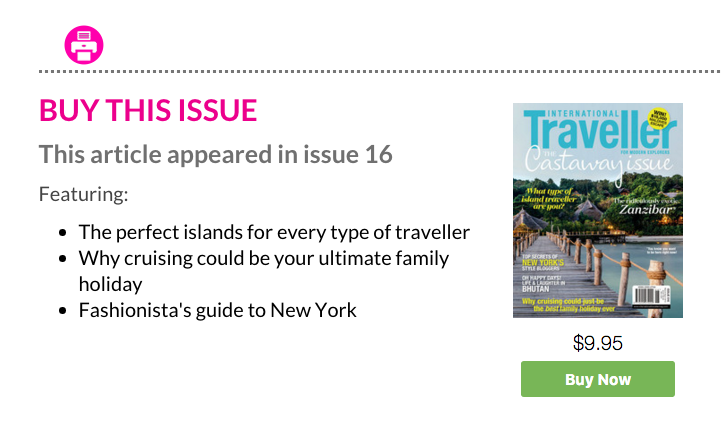
For a publisher who manages a network of magazines, like Condé Nast, Shopify might power a single admin where buy buttons could be created for every issue of each magazine, and those buy buttons could be embedded into their existing online properties - without the need to move to an entirely different platform.
5. Using Buy Buttons For Digital & Real-Life Events
Embedding buttons positions you to capitalize on the buzz, hype, and excitement surrounding live events like:
- Speeches
- Trade shows
- Product launches
Rather than collecting email addresses, inviting users to a webinar, or asking people to register so they can market an event later, beauty retailer, Madre uses buy buttons to sell advanced makeup application training courses:
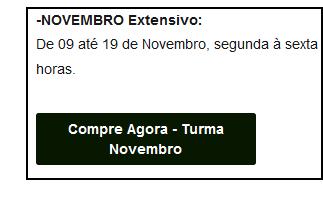
For event coordinators, the buy button gives you the freedom to control the look and feel of your web properties, without having to rely on third-party event booking sites.
At the live event, leverage the energy in real time to find opportunities to sell. With a bit of pre-planning, consider using mobile devices to generate revenue even if you’re the speaker on stage at a conference:
- Passing tablets through the audience that offer your product or service with a touch of a button
- Installing tablets or screens outside conference rooms or exhibits offering what you sell
- Display a link to a landing page with buy button in your slides during a key moment of the conference or speech and instructing the crowd to use their phones for a quick purchase
If an audience like what you have to say your stock will never be higher than it is during an event or on stage. In essence you are trending! Capitalize on this momentum by using the buy button to offer a frictionless opportunity to those you’ve wowed.
6. Using Buy Buttons to Collect Donations
The buy button provides nonprofits, churches, and charities an opportunity to completely reimagine the giving process. When people feel compelled to support a cause the last thing you want to do is add steps, complicate, or lengthen the process of doing so.
Buy buttons allow you to shorten the distance between intent and conversion. For instance, the International Security Foundation customizes buy buttons to solicit donations in support of its mission:

Imagine the ways charities, churches, and foundations might use buy buttons to make it more convenient to give:
- Engage younger churchgoers with a link to a landing page with a donate now button that makes tithing easier and more natural than slipping envelopes into a passing plate
- Place tablets on tables at charity fundraising dinners that make donating easy and contagious
7. Using Buy Buttons to Prototype & Validate Design Ideas
Redesigning an ecommerce website is a huge, often costly undertaking.
But what if before you ever wrote a line of code, you had a really good idea which new design would convert best?
Using a the drag-and-drop functionality of a tool like Unbounce, you can quickly put together new product page ideas, embed a buy button, and see how it performs.
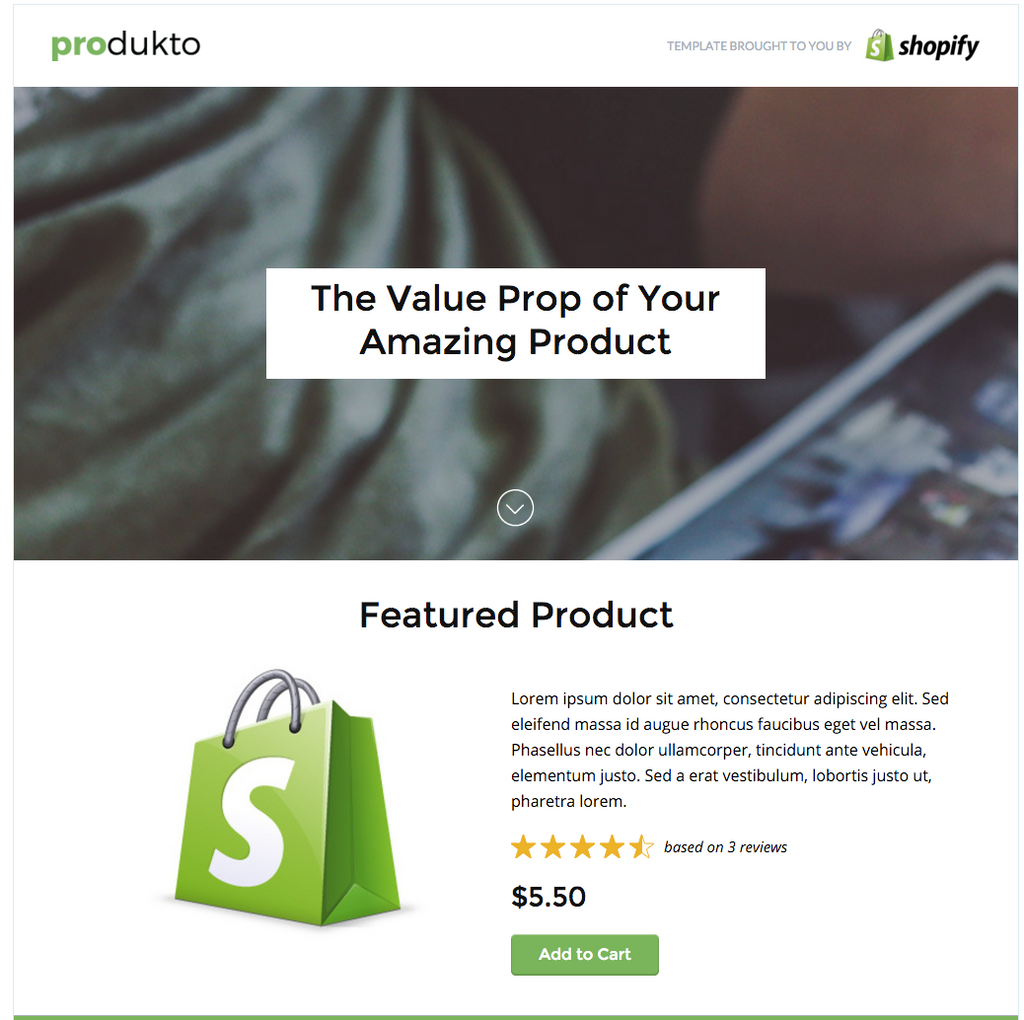
If you’re running paid ads, use Google’s content experiments and divide the traffic to split between your existing product page and your new challenger page.
If the challenger page ends up outperforming the existing page (over a statistically significant portion of time), you know it’s worth hard-coding the changes into your store’s theme and investing further resources into development. If not, keep what you have, and try another test.
Unbounce is so easy to use, you can create a ton of experimental designs in a fraction of the time it would take to hard-code a landing page.
Bonus: Using Shopify’s new Embeddable Collections feature, you could use Unbounce to mock-up new versions of category pages, and test entire ecommerce experiences without ever having to edit a theme or line of code.
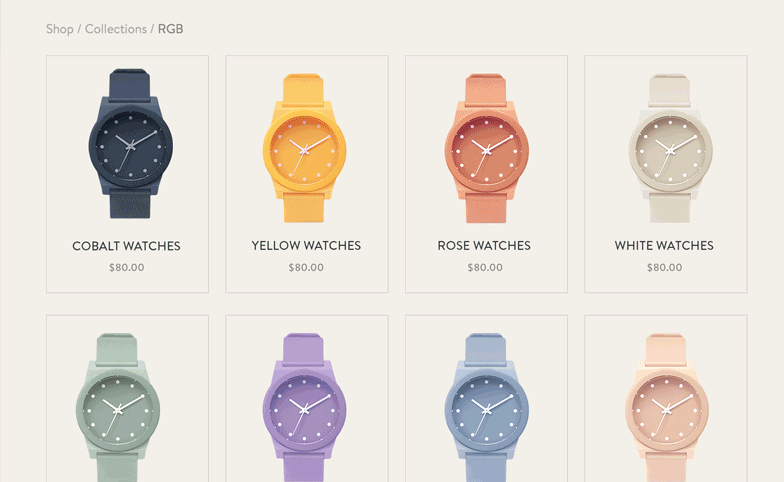
8. Use Buy Buttons to Get Comfortable When Replatforming
Replatforming is one of the biggest decisions an ecommerce company will ever make, the buy button may be used to reduce the anxiety that comes with making the desition. Buy buttons position ecommerce companies to mitigate some of the financial risk associated with choosing a new platform.
If you’re considering switching to Shopify, you can use buy buttons to curate best selling items or hold attention grabbing flash sales to get comfortable with the admin and conduct business while you migrate.
- Use buy buttons on existing WordPress site to squeeze additional value out of current URL structure while you replatform
- Create a new landing page and use buy buttons to sell as you migrate
- Organize a flash sale using buy buttons as a test to see how you like the back end of Shopify
9. Combine Buy Buttons With Lightboxes to Make Pop-Ups Useful
The buy button allows you to reinvent the interstitial experience consumers have on your site- especially for consumers who have shown prior interest in your products or are familiar with your offerings. In other words, the lightboxes you’re currently using to collect emails may be combined with buy buttons generate sales (or make a free offer).
As always, discretion is in order when using lightboxes. While pop-ups can drive quadruple-digit conversions they can also be perceived as annoying when served as interstitial ads on unrelated sites where consumers are 11x more likely not to make a purchase.
I’m betting you’re skeptical in regard to inserting buy buttons in lightboxes; collecting an email is one thing but convincing someone to make an instant purchase is another story, right?
Be smart about it, don’t use this combination on new visitors 3 seconds after stumbling upon your site. Strategically use these tools on warm prospects who are already familiar with you, or when you or the items you sell are trending:
- Time your lightbox with buy button to appear only after visitors have had an opportunity to consume much of the content on a page (use your analytics to identify average time spent so prospects don’t bounce before seeing the box)
- Implement a lightbox with buy button during retargeting campaigns in which PPC ads drive former site visitors who left without making a purchase to specific product pages they’ve previously shown interest in
- Use an exit intent popup to offer a “free gift” on the cart page to reduce abandoned checkouts
10. Use Mobile Buy Button SDK in Mobile Applications
Your reach as a marketer has been cut dramatically due to changes in consumer behavior. One of the most innovative things buy buttons can do is restore some of that reach by going where ads, sponsors, and native content have difficult times going; inside mobile applications.
Right now you can embed buy buttons- the ones we’ve discussed thus far- on the web and mobile web but not inside mobile applications where users are spending the bulk of their time:
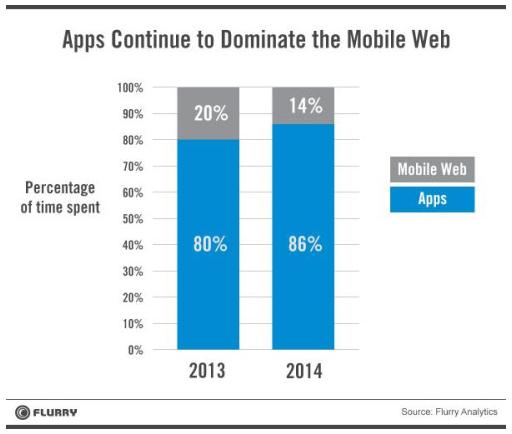
It’s why Shopify has created the Mobile Buy Button SDK you can use to build buy now buttons to sell your products inside Android and iPhone applications. Importantly, you’ll be able to target apps commanding the attention of consumers you desire to reach. It’s an extremely exciting opportunity that will allow you to add value to users inside apps:
- Offer buy now flash sales on products related to app
- Target gamers with offers related to their interests
- Offer maintenance supplies (furnace or refrigerator water filters) to people using smart appliance apps
Even more impressive, mobile app buy now button transactions may be completed with mobile wallets like Apple Pay.
11. Mobile Buy Button Turn Touch Screens Into Interactive Sales Hubs
This is where the mobile buy button SDK starts to get futuristic...
Each of the screens you walk past everyday- the ones at airports, shopping centers, and movie theatres- if they’re powered by android or use HTML - are potentially an opportunity to sell your products with buy buttons.
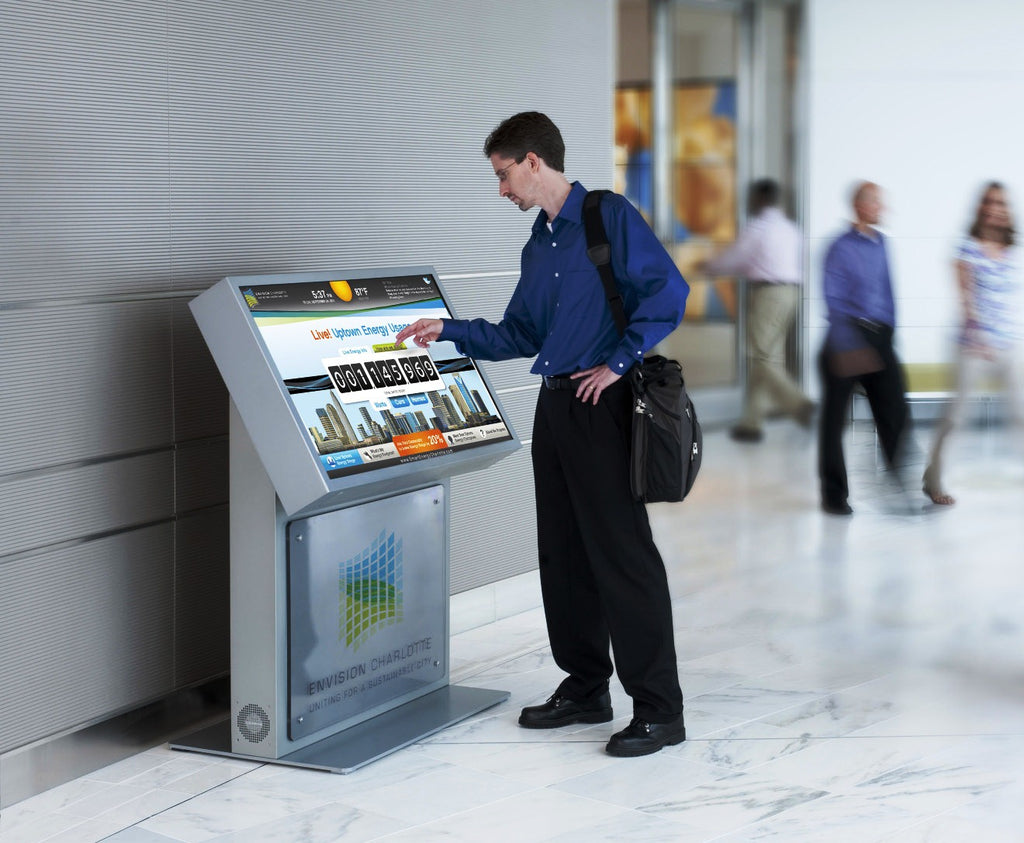
Image via Net World Alliance
Stop for just a moment and consider how big this could be; buy buttons create the potential to merge the virtual and physical worlds.
Let’s say you’re an apparel retailer with several touchscreens located on the sales floor. Buy buttons better position you to let your customers do things like:
- Buy out of stock items
- Send an item as a gift to an out of town friend
- Cross sell products based on online purchase history (logged in customers only)
With the mobile buy button SDK, you may also find opportunities to sell in locations that were previously unavailable:
- Target taxicab riders staring at screens embedded in seats in front of them
- Target diners who are eating at restaurants that use touch screen menus
- Target drivers who are watching news briefs while pumping gasoline
Think about shopping malls and the opportunities that exist for vendors of all types. Apparel carts, jewelers, and seasonal merchandisers scattered through the mall’s hallways can use touchscreens with buy buttons to offer items that are not currently on the cart.
Where there’s a screen, there’s a way!
Summary
Turning your ecommerce store into a hub with spokes all over the web is a quick way to experiment with boosting sales without much additional work. Buy buttons allow you to earn sales outside your store and in places where once there was little hope of earning a sale.
The handcuffs that largely limited ecommerce to your store have been removed. The ability to turn almost any web site, application, or physical environment into a revenue generating opportunity is exciting and ripe for experimentation. Creatively pair buy buttons with other tools to see which combos generate the greatest returns.
Most importantly, think of buy buttons as your personal sales force- one you can deploy around the globe, around the clock, and in nearly every corner of the internet.
Read more
- How to Save Time Automating Major Sales Events, Campaigns & Product Releases with Launchpad
- Ecommerce Automation Software: 10 Shopify Flow Workflow Templates
- Introducing Shopify Shipping Scripts: Innovative Shipping Customizations To Grow Your Business
- 21 Ecommerce Personalization Examples & 7 Scalable Tactics
- What is an Order Management System (OMS)? Your Guide to Choosing One
- What are the retail trends for 2023?
- Ecommerce Basics: A 101 Guide
- 6 Best Open-Source Ecommerce Platforms for 2023
- Shopify Migration | Transfer Your Store or Website to Shopify
- The Top 6 Benefits of Headless Commerce



